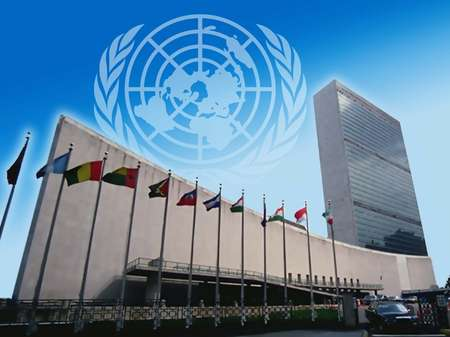
The U.N. General Assembly unanimously approved a resolution Thursday recognizing “the unprecedented effects” of the coronavirus pandemic and calling for “intensified international cooperation to contain, mitigate and defeat” the COVID-19 disease- AP reports.
It was the first resolution adopted by the 193-member world body on the pandemic that is sweeping the world and reflects global concern at the fast-rising death toll and number of cases.
The assembly did not approve a rival resolution sponsored by Russia calling for U.N. solidarity in the face of the challenges posed by the new virus and urging an end to trade wars, protectionist practices and unilateral sanctions without U.N. Security Council approval.
Register for Tekedia Mini-MBA edition 18 (Sep 15 – Dec 6, 2025) today for early bird discounts. Do annual for access to Blucera.com.
Tekedia AI in Business Masterclass opens registrations.
Join Tekedia Capital Syndicate and co-invest in great global startups.
Register for Tekedia AI Lab: From Technical Design to Deployment.
Under new voting rules instituted because the General Assembly isn’t holding meetings, a resolution is defeated if even a single country objects to it. Normally, assembly resolutions are adopted by majority votes or by consensus.
Diplomats said the European Union, United Kingdom, United States and Ukraine objected to the Russian draft, which was co-sponsored by the Central African Republic, Cuba, Nicaragua and Venezuela.
General Assembly President Tijjani Muhammad-Bande sent a letter to member nations late Thursday saying that although an extension for objections to the Russian draft had been granted until Tuesday at 6 p.m. EDT, “subsequent consultations with several delegations clearly indicated that further time will not facilitate the resolution of the differences expressed.” Therefore, he said, the time for objections “has come to an end, effective immediately,” and the resolution remains defeated.
Bande sent a letter earlier Thursday evening informing all U.N. member nations that there were no objections to the other resolution, titled “Global Solidarity to fight the coronavirus disease” and sponsored by Ghana, Indonesia, Liechtenstein, Norway, Singapore and Switzerland. He said it was approved and is in effect.
The resolution reaffirms the General Assembly’s “commitment to international cooperation and multilateralism and its strong support for the central role of the United Nations system in the global response to the coronavirus disease 2019 (COVID-19) pandemic.”
It calls on U.N. Secretary-General Antonio Guterres to lead the mobilization and coordination of a global response to the pandemic “and its adverse social, economic and financial impact on all societies.”
The resolution recognizes COVID-19’s “severe disruption to societies and economies, as well as to global travel and commerce, and the devastating impact on the livelihood of people,” and stresses that “the poorest and most vulnerable are the hardest hit” and must be helped.
The resolution also emphasizes the need to respect human rights and oppose “any form of discrimination, racism and xenophobia in the response to the pandemic.”
The 15-member Security Council is expected to discuss the pandemic sometime next week. It is likely to have two resolutions to consider, one backed by the council’s 10 elected members and the other by permanent member France.
On March 1, the UN released $15 million in aid for vulnerable countries as coronavirus spread across the world – its first monetary response to the health crisis that started in China in late December 2019. The fund was released to the World Health Organization (WHO) and the United Nations Children’s Emergency Fund (UNICEF), to be used on essential activities such as monitoring the spread of the virus, investigating cases and the operations of national laboratories.
The Emergency Relief Coordinator and Under-Secretary for Humanitarian Affairs, Mark Lowcock said then that there was no evidence that the virus was spreading freely, but there is a need for the world to act fast in putting up preventive measures to contain the spread.
“We do not yet see evidence that the virus is spreading freely. As long as that’s the case, we will still have a chance of containing it. But swift and robust action must be taken to detect cases early, isolate and care for patients, and trace contacts. We must act now to stop this virus from putting more lives at risk.
“This grant from the UN’s Emergency Fund will help countries with fragile health systems boost their detection and response operations. It has the potential to save the lives of millions of vulnerable people,” he said.
The current speed of the spread proved the UN underestimated COVID-19’s capabilities and therefore called for further action. On March 23, the Secretary General called for immediate global ceasefire as everyone’s attention is needed to focus on the one fight the virus has brought upon humanity.
“To warring parties: pull back from hostilities. Silence the guns, stop the artillery; end the airstrikes. This is crucial to help create corridors for life-saving aid, open windows for diplomacy and bring hope to places among the most vulnerable,” UN’s Spokesperson said on March 23.
Following this call, the UN’s Secretary General launched the Global Humanitarian Response Plan on March 25. It’s a $2.01 billion humanitarian aid aimed at cushioning the effects of COVID-19 globally, especially in developing countries.
This Resolution urging further global cooperation has become necessary as the virus ruthlessly escalates across countries, undermining previous resolutions and measures put in place by the WHO and UN.



